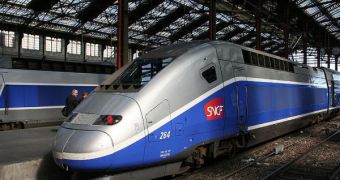The state of California is currently getting ready to invest more than $50 billion into a state-of-the-art railroad system, one that would take strain off the already-crowded airport and road systems. The move is being hailed by supporters, who say that the bold initiative will make for a smoother and less polluting ride, while at the same time offering around 450,000 jobs during construction, and others when the new steel roads are finished. The plan is to introduce ultra-high speed trains, similar to those currently in service in France and Japan.
The scheme upholds that the railroad will span a distance of roughly 800 miles (1,200 kilometers), and that the trains circulating it will reach a speed of 220 mph (350 kph). And the best part about it is that it will reduce the costs of infrastructure repairs by 50 percent. Otherwise, more than $100 billion would have to be spent on repairing airports and creating new highways to various destinations.
“We need a high-speed rail. Our rail system in America is so old, we are driving the same speed as we did 100 years ago. We should do what other countries do. All over the world we see high-speed rail. We should do the same in this country, and especially in this state,” Arnold Schwarzenegger, the Governor of California, says.
The total population of California is expected to exceed 50 million by 2030, and therefore new transport systems have to be devised in order to handle ever-increasing transportation demands. “It would be difficult, if not impossible, to add that kind of airport capacity and freeway capacity. Plus, the environmental benefit is just as important, with 12 million barrels of oil saved each year,” the Chairman of the California High-Speed Rail Authority, Quentin Kopp, adds in an interview for the AFP.
Critics of the plan maintain that it's too expensive, and that the costs will outweigh the benefits. They explain that the environmental benefits will be too small to consider, and that the money should be invested as planned. Indeed, these are the people that would rather invest twice as much money into something that is worse for the environment and that in a few years would become incapacitated.
A report on the high-speed train system, put together by the libertarian think tank Reason Foundation, argues that “There is little likelihood that the passenger or revenue projections will be met, that the aggressive travel times will be achieved, that the service levels promised will be achieved, that the capital and operating costs will be contained consistent with present estimates, that sufficient funding will be found or that the system will be profitable.”

 14 DAY TRIAL //
14 DAY TRIAL //